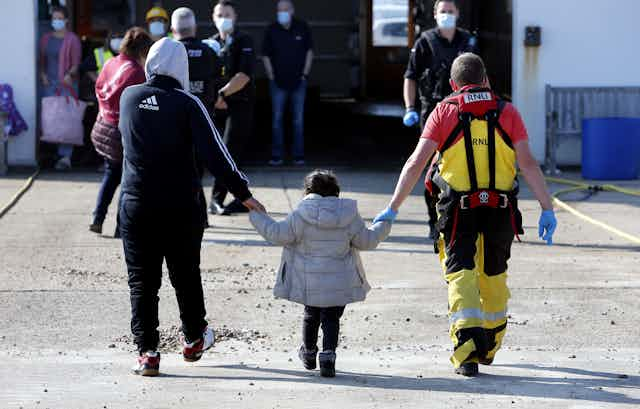The illegal migration bill passed through the House of Commons earlier this year, but is being fiercely contested in the House of Lords. The bill is currently at the committee stage which allows the members to scrutinise the text and make amendments.
With only five days scheduled for this process, the debate continued overnight on June 7 until 4am. Many were frustrated with the unusually late sitting.
Peers expressed concerns about a number of provisions in the government’s plan to deter migrants from crossing the channel in small boats. But a key sticking point has been the issue of detention for immigration purposes, particularly of children.
The Immigration Act 2014 banned the detention of unaccompanied children (who have arrived in the UK without a responsible adult) for more than 24 hours at any one time. But there are still some circumstances where unaccompanied children are detained. For example, when awaiting an age assessment if the Home Office believes they are over 18.
The new bill would allow the government to indefinitely detain all asylum seekers who enter the UK illegally, including children and potential victims of trafficking.
In a strong condemnation of this aspect of the bill, Conservative peer Baroness Mobarik described detention without charge or trial as “one of the most draconian powers the state has over the individual”. She summed up the proposed reintroduction of child detention succinctly: “This cannot be right.”
If an unaccompanied child who arrives in the UK illegally is from a safe country of origin, they may be returned there even before they reach 18. Crossbench peer Baroness Butler-Sloss described a hypothetical situation where a 10-year-old could live and attend school in England for several years, only to be callously uprooted under the proposals. They could be removed at age 18 (or earlier) to a country where they may not know the language or have family or other connections. She described the bill as “quite simply … cruel.”
Child victims of modern slavery
Researchers and activists have been criticising the bill’s proposals that would deny certain protections and support to potential victims of modern slavery, including “unaccompanied asylum-seeking children” or “unaccommpanied children”. This label alone means refugee children are often excluded from the duties and protections that are afforded (at least in theory) to all children in England and Wales.
But the current protections are not as strong as activists may like, and children in particular face many barriers in the immigration system. Only 2% of child trafficking victims between 2019-2020 with irregular migration status in the UK were granted the leave to remain. This is despite being entitled to such protections under several aspects of international law.
As I wrote in evidence for Parliament’s human rights joint committee, the proposals will have a detrimental impact on children. They may even increase the risk of child exploitation or going missing, as has already happened with asylum-seeking unaccompanied children in hotel accommodation.
Read more: Migrant children in the UK are going missing from care – here’s how to protect them
International law
Measures to clamp down on irregular migration are often enacted in the name of combating modern slavery and trafficking. But they have had calamitous consequences for people entitled to protection under international law on refugees. Often, children are caught up in these policies.
During the remaining two days of committee stage, peers (including some from the Conservative party) will continue arguing for a number of amendments to the bill. One would prevent the government from breaching international law relating to refugees and human rights.
One such treaty is the Convention on the Rights of the Child 1989, the most widely ratified human rights treaty in the world. While not immune to criticism, it is pivotal in the protection of children’s rights globally. Under the convention, the UK government has clear obligations when it comes to the protection, care and treatment of unaccompanied or separated asylum-seeking children.
In this regard, the illegal migration bill has drawn a range of international criticism. The UN’s Committee on the Rights of the Child urged the government to “repeal all draft provisions that would violate children’s rights. This includes ensuring that all asylum-seeking and refugee children can access necessary support, and to guarantee that unaccompanied children have a right to apply for family reunification.

Researchers and activists called on the home office in 2022 to ensure that immigration and asylum system does not re-traumatise children or increase the risk of exploitation. They emphasised the negative impact of lengthy immigration procedures on young people.
Unaccompanied children are subject to considerable psychological harm as a consequence of the threat of detention and removal. The discretionary power of the home secretary to return Albanian unaccompanied minors to Albania – as could happen under the bill’s proposals – may violate their human rights.
As long as children in the UK’s immigration system face restrictions and the removal of their rights, this bill will be in clear violation of international law. The attempt to push through an inhumane and punitive piece of legislation should alarm us all.

